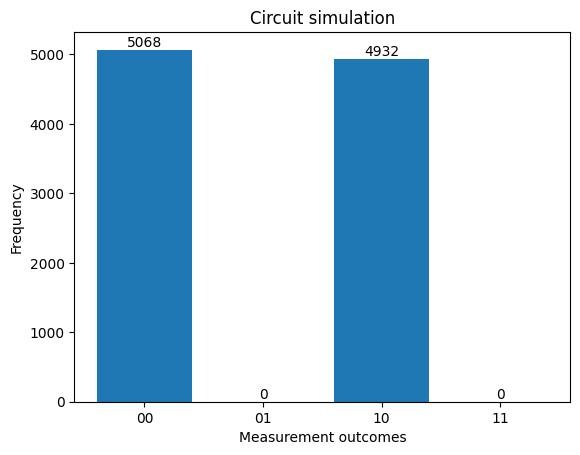Getting Started¶
Installation¶
Guppy is installed as the guppylang Python package.
pip install guppylang
Guppy can be used with Python versions 3.10, 3.11, 3.12, 3.13 and 3.14. The MacOS, Linux and Windows operating systems are supported.
The source code for Guppy can be found in a public repository on GitHub. If you have a feature request or think you have found a bug, feel free to raise a GitHub issue.
Guppy programs can be executed on the Selene emulator. As of the v0.21 release, Selene is now included with guppylang and powers the guppylang.emulator module under the hood.
Example: A simple circuit¶
As a first example, let’s write a Guppy program to implement a simple quantum circuit.
This circuit is deliberately designed to involve some classical control based on measurement outcomes:

You can see the intermediate states of the qubits as the circuit progresses annotated on the dashed lines. Try to reason along! Using Guppy, the prediction of the resulting state / measurement outcomes can be numerically supported using an emulator.
To implement this circuit, we define a Python function with the @guppy decorator.
Since our circuit takes no inputs, the function does not have to have any parameters.
Similarly, as the circuit prepares a single-qubit state, we must annotate the function with the corresponding return type.
We also record the outcome of the mid-circuit measurement for later evaluation using result, as this will make it available later once we run the simulation.
from guppylang import guppy
from guppylang.std.builtins import result
from guppylang.std.quantum import cx, h, measure, qubit, x
@guppy
def simple_circuit() -> qubit:
q1, q2 = qubit(), qubit()
h(q1)
cx(q1, q2)
outcome = measure(q1)
result("q1", outcome)
if outcome:
x(q2)
return q2
simple_circuit.check()
For execution, we can write a function that invokes the circuit and consumes the produced qubit via a measurement. The outcome is recorded for later evaluation as well.
@guppy
def evaluate() -> None:
q = simple_circuit()
result("q2", measure(q))
Finally, we can emulate our circuit implementation using the stabilizer simulator.
Our program is executed for a single shot using the run method.
emulator = evaluate.emulator(n_qubits=2).stabilizer_sim().with_seed(3)
sim_result = emulator.run()
list(sim_result.results)
[QsysShot(entries=[('q1', 1), ('q2', 0)])]
However, this is only a single shot.
We can produce larger numbers of shots using the same API by changing the configuration of the emulator.
Let’s do this and plot the results using matplotlib:
import matplotlib.pyplot as plt
import numpy as np
shots = evaluate.emulator(n_qubits=2).with_seed(0).with_shots(10000).run()
fig, ax = plt.subplots(1, 1)
possible_outcomes = ["00", "01", "10", "11"]
idx = np.asarray(list(range(len(possible_outcomes))))
counts = [len([1 for shot in shots if str(shot.as_dict()['q1']) + str(shot.as_dict()['q2']) == o]) for o in possible_outcomes]
bars = ax.bar(idx, counts)
ax.bar_label(bars, labels=counts)
ax.set_title("Circuit simulation")
ax.set_xlabel("Measurement outcomes")
ax.set_xticks(idx)
ax.set_xticklabels(possible_outcomes)
ax.set_ylabel("Frequency")
plt.show()

The results roughly match the expected distribution that was predicted in the circuit.
That’s it, you executed your first Guppy program successfully! To see more examples of Guppy programs, take a look at the Examples Gallery.